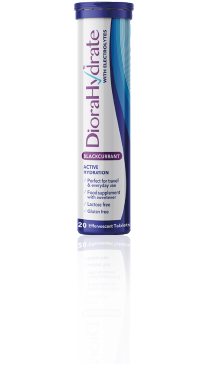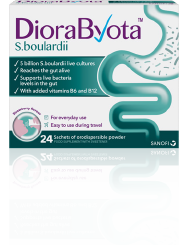Food supplements
Customers may ask for a suitable product to help with hydration during or after exercise.
DIORAHYDRATEACTIVE HYDRATION

DioraHydrate is a food supplement* that is scientifically formulated with precise amounts of electrolytes and carbohydrates. It can be recommended for everyday hydration, including during or after exercise or in hot weather.
- Compact tube of 20 tablets
- Blackcurrant flavoured
- Suitable for daily use
- Convenient for use on the go
- Lactose- and gluten-free
- Can be recommended for adults and children from one year.
If a customer is purchasing products for a holiday, you could make them aware of a food supplement* in the Diora range that may help support their gut bacteria while travelling.
DIORABYOTASUPPORTS GUT BACTERIA

DioraByota is a food supplement* containing S. boulardii live cultures, designed to reach the gut alive and to support the live bacteria levels in the gut. It also contains fructo-oligosaccharides as a source of dietary fibre that further helps support gut bacteria, as well as vitamins B6 and B12 which may contribute to the reduction of tiredness and fatigue.
- Handy sachets for travelling
- Orodispersible with no need for water
- Strawberry flavoured
- Can be recommended for adults and children from 3 years.
*It is important to have a varied and balanced diet along with a healthy lifestyle. Food supplements should not be used as a substitute for a varied diet.
The content of this page is not covered by the NPA Seal.
Proceed to the next screen to test your knowledge and record your learning.
Pharmacists and pharmacy technicians can use this training as one of their CPD records to count towards their revalidation.
The content of this material has been approved by the NPA. The NPA will have no liability to any person or entity with liability, loss or damage caused or alleged to have been caused directly or indirectly by information therein. The NPA is not responsible for the content of any non-NPA websites mentioned in this programme or for the accuracy of any information found there. The fact that a website, organisation or product is mentioned in the programme does not mean that the NPA either approves of it or endorses it.
References
1. https://www.nhs.uk/conditions/dehydration/
2. https://www.nhsinform.scot/illnesses-and-conditions/nutritional/dehydration
3. https://www.healthline.com/nutrition/electrolytes
4. https://bnf.nice.org.uk/treatment-summary/diarrhoea-acute.html
5. Dioralyte SMpC: https://www.medicines.org.uk/emc/product/2773/smpc
6. Mecrow IK, Miller V. An open triple crossover study comparing water absorption from potable water, Lucozade, and Dioralyte using the stable isotope 18O. J Pediatr Gastroenterol Nutr. 1993 Apr;16(3):316-20.
7. Dioralyte Relief SMpC: https://www.medicines.org.uk/emc/product/274/smpc
All references last accessed June 2021
Dioralyte© Natural (GSL), Dioralyte© Blackcurrant (GSL), Dioralyte© Citrus (GSL), Dioralyte© Natural Sachets (P), Dioralyte© Blackcurrant Sachets (P), Dioralyte© Citrus Sachets (P), Product Information
Presentation: Powder for reconstitution with 200 ml water containing glucose 3.56 g, sodium chloride 0.47 g, potassium chloride 0.30 g, disodium hydrogen citrate 0.53 g in each sachet. Indications: GSL: For the treatment of fluid and electrolyte loss associated with acute diarrhoea. P: Oral correction of fluid and electrolyte loss in infants, children and adults. Treatment of watery diarrhoea of various aetiologies including gastroenteritis in all age groups. Dosage and administration: Each sachet should be reconstituted in 200ml fresh drinking water. For infants or where drinking water is not available, the water should be freshly boiled and cooled. The solution should be made up immediately before use and may be stored for up to 24 hours in a refrigerator. Daily intake may be based on a volume of 150ml/kg body weight for infants up to the age of 2 and 20-40ml/kg body weight for adults and children. A reasonable approximation is: Infants up to the age of 2: One to one and a half times the usual 24-hour feed volume. Children: One sachet after each loose motion. Adults (including the elderly): One or two sachets after every loose motion. More may be required initially to ensure early and full volume repletion. Contraindications: Hypersensitivity to any of the ingredients. Treatment with Dioralyte may be inappropriate in conditions such as intestinal obstruction requiring surgical intervention. Warnings and precautions: Oral administration only. Sachets should always be dissolved in 200ml of water. If diarrhoea persists for longer than 24 - 48 hours seek medical advice. Not to be used in infants below the age of 24 months without medical supervision. Infants under the age of 2 with diarrhoea should be seen by the physician as soon as possible. Dioralyte should not be used for self-treatment in patients with chronic or persistent diarrhoea, liver or kidney disease, diabetes, intestinal obstruction and in patients on low potassium or sodium diets. The use of Dioralyte in patients with these conditions should be supervised by a physician. If nausea and vomiting are present with diarrhoea, small frequent amounts should be drunk at first. Dioralyte contains approximately 300 mg sodium per sachet, equivalent to 15% of the WHO recommended maximum daily intake of 2 g sodium for an adult. Pregnancy and lactation: Dioralyte is not contraindicated in pregnancy or lactation. Medical supervision is recommended for use during pregnancy and lactation. Side effects: None stated. RRP (ex VAT): 6 sachets £3.08, 20 sachets £9.22. Legal category: P & GSL. MA numbers: Dioralyte Natural PL 04425/0271, Dioralyte Blackcurrant PL 04425/0250, Dioralyte Citrus PL 04425/0269, Dioralyte Natural Sachets PL 04425/0270, Dioralyte Blackcurrant Sachets PL 04425/0211, Dioralyte Citrus Sachets PL 04425/0270. MA holder: Sanofi, 410 Thames Valley Park Drive, Reading, Berkshire, RG6 1PT, UK. Further information is available from Sanofi, 410 Thames Valley Park Drive, Reading, Berkshire, RG6 1PT. Email: uk-medicalinformation@sanofi.com
Date of preparation: February 2021 MAT-GB-2100469 (v1.0)
Dioralyte© Relief Raspberry (GSL), Dioralyte© Relief Blackcurrant (GSL), Dioralyte© Relief Blackcurrant Sachets (P) Product Information
Presentation: Powder for reconstitution with water containing pre-cooked rice powder 6 g, sodium citrate 580 mg, sodium chloride 350 mg, potassium chloride 300 mg in each sachet. Indications: GSL: For the treatment of fluid and electrolyte loss associated with acute diarrhoea. P: Oral correction of fluid and electrolyte loss in infants aged 3 months upwards, children and adults. Treatment of watery diarrhoea of various aetiologies including gastroenteritis from 3 months upwards. Particularly recommended in the case of too loose or frequent stools where it enables over-loose stools to revert to normal. Dosage and administration: Adults and children over 1 year: One sachet after each loose motion up to a maximum of 5 sachets per day for 3-4 days. Infants 3 months to 1 year under medical advice: weight loss assessed at < 10%: 150 – 200 ml/kg/24 hours, half the volume to be given during the first 8 hours and the other half during the next 16 hours. In the event of vomiting accompanying the diarrhoea, the amount administered can be divided up (5 to 10 ml every 5 minutes) and this may be gradually increased until the infant can drink normally. Under 3 months: Not recommended. Dioralyte Relief should not be reconstituted in diluents other than water. Each sachet should be reconstituted in 200 ml drinking water. Mix well until the liquid has a milky appearance and drink the whole glassful. Where drinking water is not available the water should be freshly boiled and cooled. Reconstituted solution should be used within 1 hour or within 24 hours if stored in a refrigerator. Contraindications: Hypersensitivity to the active substances or to any of the excipients listed for this product. Patients with phenylketonuria. Treatment with Dioralyte Relief may be inappropriate in conditions such as intestinal obstruction, severe renal and hepatic impairment. Warnings and precautions: Dioralyte Relief should not be administered to infants under 3 months and for those aged 3 months to 1 year, administered under medical advice. Infants under the age of 2 with diarrhoea should be seen by a doctor as soon as possible. If diarrhoea persists unremittingly for longer than 36 hours the patient should be reassessed by the doctor. Care should be taken in cases where normal electrolyte balance may be disturbed (such as severe vomiting or diarrhoea). Patients on low potassium or sodium diet should only use Dioralyte Relief under the supervision of a physician. Dioralyte Relief contains 190 mg sodium (main component of cooking/table salt) in each sachet, equivalent to 10% of the WHO recommended maximum daily dietary intake of 2g of sodium for an adult. Pregnancy and lactation: Dioralyte Relief is not contraindicated in pregnancy or lactation but should be used on medical advice. Side effects: Unknown frequency: hypersensitivity. RRP (ex VAT): 6 sachets £3.42, 20 sachets £9.76. Legal category: P & GSL. MA numbers: Dioralyte Relief Blackcurrant (GSL) PL 04425/0273, Dioralyte Relief Blackcurrant Sachets (P) PL 04425/0272. Dioralyte Relief Raspberry (GSL), PL 04425/0280. MA holder: Sanofi, 410 Thames Valley Park Drive, Reading, Berkshire, RG6 1PT, UK. Further information is available from Sanofi, 410 Thames Valley Park Drive, Reading, Berkshire, RG6 1PT. Email: uk-medicalinformation@sanofi.com
Date of preparation: December 2020 MAT-GB-2005167 (v1.0)
Adverse events should be reported. Reporting forms and information can be found at www.mhra.gov.uk/yellowcard or search for MHRA
Yellow Card in Google Play or Apple App Store. Adverse events should also be reported to Sanofi drug safety department on 0800 0902314
